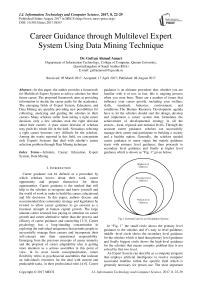Career Guidance through Multilevel Expert System Using Data Mining Technique
Автор: Gufran Ahmad Ansari
Журнал: International Journal of Information Technology and Computer Science(IJITCS) @ijitcs
Статья в выпуске: 8, 2017 года.
Бесплатный доступ
In this paper, the author provides a framework for Multilevel Expert System to advice scholars for their future career. The proposed framework aims at providing information to decide the career paths for the academics. The emerging fields of Expert System, Education, and Data Mining are speedily providing new possibilities for collecting, analyzing and guiding the scholars in their careers. Many scholars suffer from taking a right career decision, only a few scholars took the right decision about their careers. A poor career decision of scholars may push his whole life in the dark. Nowadays selecting a right career becomes very difficult for the scholars. Among the works reported in this field, we concentrate only Experts Systems that deal with scholar's career selection problem through Data Mining technique.
Scholars, Career, Education, Expert System, Data Mining
Короткий адрес: https://sciup.org/15012670
IDR: 15012670
Текст научной статьи Career Guidance through Multilevel Expert System Using Data Mining Technique
Published Online August 2017 in MECS
Career guidance can be defined as a procedure by which scholars knows about their work, career opportunity and prepare themselves for those opportunities. Career guidance is the method that will help to the scholars to recognize and know yourself and the world of work in order to build the career, educational, and life decisions. In this paper, authors discuss and recommended that community strategy and legislation be twisted to allow career guidance to go onward as a foremost strength in human capital growth. The large amount career research has paying to attention on career growth and career alternative rather than the process and efficacy of career guidance and counseling [1-3]. Career psychology has a long-standing concentration in exploring the individual uniqueness that permits people to successfully manage their careers and incorporate their self-concept into their operational responsibility. Emerging from the previous concepts of career maturity and the proposal of career adaptability idea is getting more attention as a serious assembles in this point of view. In its most recent conceptualization, career flexibility refers to psychosocial assemblies that indicate an individual's resources for the deal with current and predictable tasks, in their professional roles [4-6]. Career guidance is an ultimate procedure that, whether you are familiar with it or not, in fact, this is ongoing process when you were born. There are a number of issues that influence your career growth, including your welfare, skills, standards, behavior, environment, and conditions. The Human Resource Development agenda have to let the scholars should start the design, develop and implement a career system that formulates the achievement of developmental strategy in all the sectors—local, regional and national levels. Through the accurate career guidance, scholars can successfully manage their career and participate in building a society and a healthy nation. Generally, the scholars needed career guidance in many stages but mainly guidance starts with primary level guidance, then proceeds to secondary level guidance and finally at higher level guidance which is shown as “Fig. 1” given below;
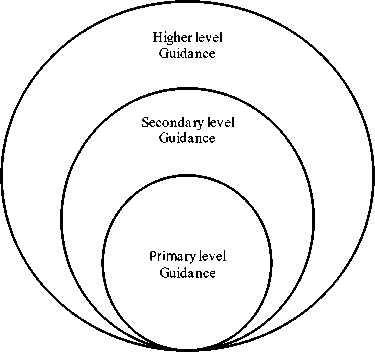
Fig.1. General Career Level Guidance System
In “Fig. 1” the small circle shows the primary level guidance to the scholars and it’s easy to level guidance, middle -level circle shows the secondary level guidance for the scholars which is hard than primary level guidance and finally biggest circle shows the high-level guidance for the scholars that means complex problem that is not solved by first two level.
An Expert System can describe as a computer program that employs artificial intelligence to resolve computer associated troubles within the specific field which is generally necessary for person use. The most important objective of Expert System is to be aware of intelligence by constructing computer programs that show the intelligence activities, it is anxious through an idea that process representative inference through the system and how the information use to make those inferences will be characterized [7-8].The expert systems skill broadly accepted by IT development companies. Expert System is a type of application which is executed in the system where it can recall when it needed and does the work as an expert work and gives guidance to the scholars as an expert [9].One of the main requirements for designing an expert system is knowledge of database an entity, which study and understand the database and how human expert are making decisions and interpret the rules into terms that computer can recognize and complete the task. The key idea of expert systems is to give a professional advice when scholar looking a guidance from a system for their career. Through this kind of system application scholars can replicate their actions [10].

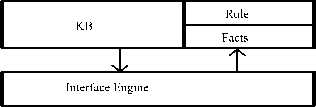
Fig.2. General Architecture of an Expert system
“Fig. 2” given above shows the general architecture of Expert System (ES).The formation of information is known as the field of ES. Generally, there are three main important mechanisms of ES that can be recognized as a Knowledge base (KB), Inference Engine (IE) and User (U) [11-12].This knowledge basically holds the domain knowledge which is in work by the inference engine to describe wrapping up. Generally, knowledge obtains from human export through meeting and explanation after that this knowledge frequently represented in the form of IF-THEN rules. The area of education is an extremely active and demanding area to apply the above techniques. Career guidance is required by the scholars but did not get the guidance through the system then Expert System retrieves the scholar’s query from the database and sends this query to an expert domain and expert domain will add the guidance in the system.
Data mining can be defined as database mining or Knowledge Discovery in Databases (KDD) that aim to find out useful information from the large datasets. Data mining is taking out of unknown information from the large database. This is a commanding new technology with big potential which facilitates organizations to the center of attention on the most important business process information in their data warehouses [13-14]. Occasionally data mining is also known as a knowledge discovery. Knowledge discovery is the method of analyzing data from various viewpoints and shortening it into meaningful and helpful information. Data Mining has been fruitfully implemented to many real world demanding problems. As a result, data mining has become accepted as a business intelligence tool with the huge development projection [15]. Despite the fact that there are many data mining techniques, most of the work that has been done in education that falls into the group of classification, clustering, visualization, and association analysis etc. [16-19].
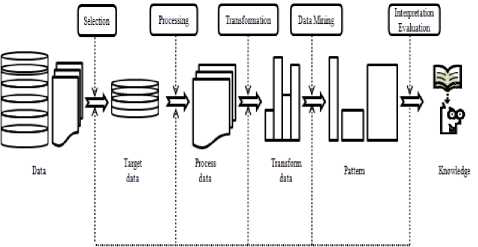
Fig.3. General structure of Data mining process to build up knowledge
“Fig. 3” Shows the general structure of Data Mining process which builds up knowledge. In this figure, target data is selected from the database. After selecting the target data it process and transform to apply data mining using pattern and executes the pattern for the estimation to convert the data into knowledge. The knowledge base is capable of utilizing the brainpower of the system as given essential information for assembling policies are controlled in the knowledge base system. This information is applied as a foundation of a set of laws for the system [20].
-
II. Proposed Career Guidance Multilevel Expert System Framework for Scholars
The contribution of this paper can be summarized as follows:
-
- Design a Career Guidance Multilevel Expert
System Framework for Scholars
-
- Quantization of factors
-
- Use of Machine Learning (ML) technique for
discovering connection between factors and this is very useful for large database
The rest of the paper is organized as follows: Sections II provide a proposed career guidance multilevel expert system for scholars and discuss the framework in details. Section III illustrates the experimental study. Finally, section IV deals results and conclusion of scholar’s queries.
Guidance got in the system database
Scholars
Needed guidance
Primary level

Database
Secondary level
Search in database
Guidance found
Similar guidance
Guidance
Not found New guidance
Higher level
New Solution
Level of guidance
Simple Problem
Hard
Problem
Complex Problem
Updated Database
Domain Specific problem guidance Level
Problem Domain Experts
Solution generating Process
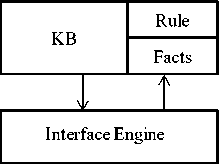
Operational Problem
Technical Problem
Others Problem
Knowledge of new guidance problem
-
Fig.4. Career Guidance Multilevel Expert System Framework for Scholars
-
III. Experimental Study
Table 1 shows the different influencing career guidance factors which influence scholar’s career decision. These influencing factors are very important for the scholars in selecting the precise career. In this table, each influencing factor with their meaning and their influence are given and each influencing factor has a numerical weight and this numerical weight is consider for scoring the different scholar’s selection factors. All factors have minimum one and maximum five value, scholars can select any value between it. These values are given by the scholars and that wants the advice from the system then system matched these values for the system database and advice the precise guidance to the scholars [21, 22].
Table 1. Influencing Career Guidance Factors
|
S. No. |
Factors |
Meanings |
Score Rubrics |
|||||
|
Very Poor (1) |
Poor (2) |
Medium (3) |
Good (4) |
Excellent (5) |
||||
|
1 |
Computer Skills |
Knowledge of computer |
I don’t use computer |
I can just check emails & messages |
I can use office Software |
I can write software program |
I can design H/Wand S/W |
|
|
2 |
Office Experience |
Having experience to manage the office activity |
I cannot manage office activity |
I can manage office use stationary activity |
I can manage office use stationary and attendance activity |
I can manage office use stationary, attendance and HR activity |
I can manage all activity of office like HR, Mkt, A/c etc. |
|
|
3 |
Location |
Place where he or she can work |
I cannot work in rural remote areas |
I can work only in rural remote areas |
I can work in rural and remote areas |
I can work with modernity connected areas |
I can work only metropolitan with areas |
|
|
4 |
Financial Status of money |
Capable of expense in career |
Cannot expense money |
Partially expense money |
Moderately expense money |
Strongly expense money |
Very strongly expense money |
|
|
5 |
Interest |
Personally interested working area |
I can work only my interest area |
I can work some other than my interest area |
I can work in both area |
I can work in both area effectively |
I can work in both area efficiently |
|
|
6 |
Age |
Working age of the employee |
Very old and very Young |
Young and Old Young |
Moderately young and old |
Golden age |
Excellent golden age |
|
|
7 |
Parents |
Parents preference in selection of career |
Do not agree to work in rural areas |
Partially agree to work in rural areas |
Agree to work in rural areas |
Strongly agree to work in rural areas |
Very strongly agree to work in rural areas |
|
|
8 |
Culture |
Working culture |
Work in local culture |
Work in regional culture |
Work in regional and local culture |
Work in national culture |
Work in International culture |
|
|
9 |
Job Security |
Is job secure |
I am not Agree to work in private job |
Agree to work in private job |
Agree in semi Government job |
Very Agree in state Government job |
Strongly agree in Central Government job |
|
|
10 |
Medical Insurance |
Is medical insurance facility available, |
Not available |
Partial available |
Available for employee |
Available for family |
Available for family and parents |
|
|
11 |
Children Schooling |
Children Education |
Local level standard education |
Regional level standard education |
Regional and local level standard education |
National level standard education |
International level standard education |
|
|
For providing precise career guidance to the scholars matching the score of the scholars with the database for we consider Table 2 which is showing the influencing finding the precise career field for the new scholars [23-career guidance factors with the scholar’s score which is 25]. used as a sample of measuring scholar’s performance. We Nearest Neighbor (NN) calculates the closest matching used data mining model Nearest Neighbor (NN) object using a formula known widely as Euclidean technique for the implementation of this model. Table 2 Distance. is used as a sample scores to match the scholar’s score for |
||||||||
|
selecting different career fields. This Table 2. is divided mainly into three important heading and the first headings Distance (d) = represent as a scholar that show scholars data, heading two shows the factors and their score and the third heading shows a career field that is selected by the Where x denotes the sc scholar. For every scholar, we match the score with career sel,ection factors, yi is existing database and the career field that find in selection factors of new sc suggested on the score of the database. We used here the number of total factors. Nearest Neighbor (NN) data mining technique for |
n Ё (x i - y i )2 i = i ore of existing influencing the new influencing career olars. Here, n denotes the |
|||||||
Table 2. Sample scoring database for scholars of different career fields
|
Scholars |
Factors |
|||||||||||
|
1 |
2 |
3 |
4 |
5 |
6 |
7 |
8 |
9 |
10 |
11 |
||
|
л о II |
и И! П 5. О S |
Г о Я о* д & |
° S-5 | § * ^ с |
5 |
(ГО А |
£ S |
П с. с |
о В" (/) & |
» о |
тл о П (ГО Ч S |
Career Fields |
|
|
1 |
3 |
3 |
4 |
2 |
5 |
3 |
4 |
3 |
4 |
3 |
4 |
Teaching |
|
2 |
5 |
4 |
3 |
3 |
5 |
5 |
4 |
4 |
2 |
2 |
3 |
Technology |
|
3 |
3 |
3 |
3 |
4 |
3 |
3 |
2 |
5 |
4 |
4 |
4 |
Airlines |
|
4 |
2 |
1 |
4 |
4 |
4 |
4 |
4 |
5 |
4 |
5 |
4 |
Medical |
|
5 |
3 |
5 |
3 |
3 |
4 |
4 |
3 |
4 |
4 |
4 |
4 |
Banking |
|
6 |
3 |
4 |
5 |
1 |
4 |
4 |
2 |
5 |
1 |
1 |
1 |
Tour and Travel |
|
7 |
3 |
5 |
4 |
4 |
4 |
4 |
3 |
3 |
4 |
3 |
4 |
Management |
|
8 |
2 |
4 |
3 |
4 |
2 |
2 |
3 |
3 |
3 |
3 |
4 |
Legal law |
|
9 |
3 |
5 |
5 |
3 |
3 |
2 |
2 |
4 |
3 |
3 |
4 |
Media |
|
10 |
2 |
4 |
3 |
1 |
5 |
5 |
5 |
4 |
5 |
5 |
4 |
Military |
|
11 |
3 |
5 |
4 |
1 |
2 |
3 |
4 |
4 |
4 |
4 |
4 |
Office Administration |
|
12 |
2 |
5 |
5 |
3 |
4 |
3 |
4 |
3 |
3 |
4 |
3 |
Manufacturing |
|
13 |
2 |
5 |
5 |
1 |
4 |
4 |
5 |
4 |
4 |
3 |
3 |
Sales |
|
14 |
1 |
4 |
3 |
3 |
3 |
2 |
5 |
4 |
3 |
3 |
3 |
Fishing |
|
15 |
3 |
5 |
4 |
4 |
1 |
2 |
4 |
4 |
4 |
3 |
3 |
Finance |
Table 3. shows the new scholars weight and the score. Also, it shows the career guidance influencing factors in selection career. These new scholars give a numerical the value that will be used in NN data mining technique for matching and suggesting the scholars career field with existing career field.
Table 3. Sample scoring for a new scholar
|
New Scholar |
1 |
2 |
3 |
4 |
5 |
6 |
7 |
8 |
9 |
10 |
11 |
Suggested Career field |
|
(y1) |
(y2) |
(y3) |
(y4) |
(y5) |
(y6) |
(y7) |
(y8) |
(y9) |
(y10) |
(y11) |
To be decided |
|
|
3 |
2 |
3 |
4 |
3 |
4 |
1 |
3 |
5 |
4 |
3 |
Table 4. shows the career measuring score of scholars along with their given weight to each factor and sum of the weight of all factors. This table is basically used for the comparison of a score with the new scholars and nearest matching scholars to suggest the precise career field.
Table 4. Career Measuring Score
|
1 |
0 |
0 |
1 |
9 |
4 |
0 |
0 |
4 |
0 |
0 |
4.4 |
|
9 |
1 |
1 |
4 |
9 |
0 |
0 |
1 |
0 |
1 |
1 |
5.2 |
|
1 |
0 |
1 |
9 |
1 |
4 |
4 |
4 |
4 |
1 |
0 |
5.4 |
|
0 |
4 |
0 |
9 |
4 |
1 |
0 |
4 |
4 |
4 |
0 |
5.5 |
|
1 |
4 |
1 |
4 |
4 |
1 |
1 |
1 |
4 |
1 |
0 |
4.7 |
|
1 |
1 |
1 |
0 |
4 |
1 |
4 |
4 |
1 |
4 |
9 |
5.5 |
|
1 |
4 |
0 |
9 |
4 |
1 |
1 |
0 |
4 |
0 |
0 |
4.9 |
|
0 |
1 |
1 |
9 |
0 |
9 |
1 |
0 |
1 |
0 |
0 |
4.7 |
|
4 |
4 |
1 |
4 |
1 |
9 |
4 |
1 |
1 |
0 |
1 |
5.5 |
|
1 |
1 |
1 |
0 |
9 |
0 |
1 |
1 |
9 |
4 |
0 |
5.2 |
|
0 |
4 |
0 |
0 |
0 |
4 |
0 |
1 |
4 |
1 |
0 |
3.7 |
|
0 |
4 |
1 |
4 |
4 |
4 |
0 |
0 |
1 |
1 |
1 |
4.5 |
|
0 |
4 |
1 |
0 |
4 |
1 |
1 |
1 |
4 |
0 |
1 |
4.1 |
|
1 |
0 |
0 |
1 |
9 |
4 |
0 |
0 |
4 |
0 |
0 |
4.4 |
|
9 |
1 |
1 |
4 |
9 |
0 |
0 |
1 |
0 |
1 |
1 |
5.2 |
“Fig. 5” refers to the score for influencing factors for new scholars. Note that, career guidance influencing factors choice score between from 1 to 5 and new scholars need to select all 11 factors for career guidance. Figure 5 shows the score factors for the new scholars and score through the new scholar’s score can give the guidance to the scholars.
SCORES FOR FACTORS (NEW SCHOLAR)
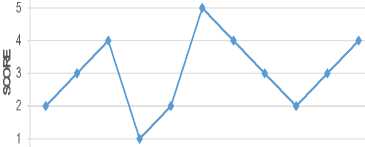
-+- Scores
7 8 9 10 11
FACTORS
Fig.5. Score factors for new scholars
“Fig.6” shows the matching score with numbers of scholars available in the database. According the matching score system suggested the career field for the new scholars is near to the Office Administration, Manufacturing, Sales, and teaching field can select for career respectively. Medical, Tour and Travel, Media and finance field are not suitable for him if he needs to select the career of any of these fields need to improve their factors as shown in Figure7.
Matching Scores with Existing Data
I4h V
3.5
1 2 3 4 5 6 7 8 9 10 11 12 13 14 15
No of schloars in the Database
Fig.6. Illustration of the matching score with the existing data
“Fig.7” refers to the score and influencing factors for comparisons score of new scholars and their nearest matching scholars and not nearest career field score. Note that, the blue line shows the new scholars score and the brown line shows the matching scholars score. “Fig.7” shows the comparisons with the nearest matching between new and closet matching scholars and can provide the guidance to the new scholars using this graph. According to the “Fig.7” new scholar’s score of its nearest score matching with the system, the score is 4, 1 and 5. According to the scholar’s score system recommended he can go with the medical career, Teaching Field, and field. Also, the figure shows that 2, 3, 9 and 11 etc. is not a suitable field for their career. Technology, Airlines, Media and office Administration field is not a suitable for the new scholars.
Comparisons of Scores for the New Scholar and Closest Matching Scholar (Office Administration)
I4
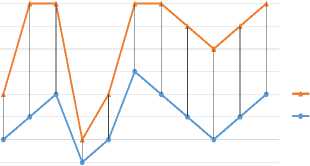
Matching Scholar New Scholar
1 2 3 4 5 6 7 8 9 10 11
Factors
Fig.7. Comparisons of score for the new scholars and closing matching scholars
Comparisons of Scores for the New Scholar and Scholar in Selected Field (Airlines)
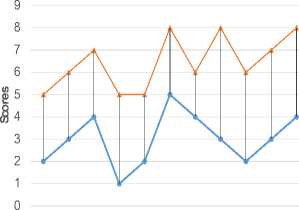
-*-Scholar in the Filed
—•—New Scholar
1 2 3 4 5 6 7 8 9 10 11
Factors
Fig.8. Comparisons of score for the new scholars and scholar in selected field
“Fig. 8” illustrates the comparison score for the new scholar and selected field by the scholars. From Figure 8 one can give the above queries answers like scholars want to make his career in Airlines field and system suggested that for his career management field is better and this is based on the weight given by the scholars. Other queries answer also can be suggested by the system that if he wants the career in Airlines field he need to improve factor 4, 5,9,10 and 11 etc.
-
IV. Results and Conclusion
The framework designed in this research paper is evaluated for a case study in educational data mining. In the framework illustrated above, scholars refer to career guidance framework for their bright future guidance. In this work, author uses data collected from a different government university and the private educational institutions in the Kingdom of Saudi Arabia.
The proposed model is suitable for answering many queries related to career guidance. For example, a scholar may have queries similar to the ones below:
Q1: Which area is best suitable for my career?
Q2: Which area is not suitable for me?
Q3: I am the good for area x?
Q4: If I am not good area in x, then which factors I need to improve to go on area x?
Q5: I want to make career in this field what factors I need to improve?
These queries and many others can be effectively answered using the proposed model. We have shown in the previous section how some of these queries can be addressed using the case study (ref. Fig 6 to 8). Other queries can be set up and data can be collected to address additional queries from the scholar.
Even though the same case study is accomplished using data from the same university, the procedure describes below is non-specific and can be applied to multiple universities or multiple educational institutions which are run in the different location. For the purpose of confidentiality, the name and ID of scholar’s are not mentioned here. Also, author uses the scholar’s name as 1, 2, 3 ……n etc. In this work, data evaluated from a total of 11 career influencing factor containing scholar’s records are analyzed. Each scholar’s record is a tuple of table 1 that shows some samples of data used in this case study. This research paper has presented a framework for scholars to select a precise career for their good future and this framework is designed with the combination of an expert system and data mining. It is an endeavor to provide the precise career guidance to the scholars. The framework is also implemented with the Data Mining technique. A multiple career influencing factors has been recognized that are important for scholars for career selection. This framework is very helpful for the scholars who especially cannot decide which career is the best for them and which career they can continue as a priority the top career. The applied justification analysis on this study concludes that proposed framework is highly acceptable.
Acknowledgement
The author is so grateful to Dr. Mohammad Tanvir Parvez from Qassim University for his valuable suggestions and comments.
Список литературы Career Guidance through Multilevel Expert System Using Data Mining Technique
- Herr., “The future of career counselling as an instrument of public policy”. The Career development quarterly, 52, 8–17, 2003
- Kerry B. Bernes Angela D. Bardick David T. Orr “Career guidance and counselling efficacy studies: an international research agenda” Int J Educ Vocat Guid, Springer Science +Business Media B.V.:81–96, 2007
- Dagley, J. C., & Salter, S. K. “Practice and research in career counselling and development—2003”, The Career Development Quarterly, 53, 99–157, 2004
- Savickas, M. L., & Porfeli, E. J. Career Adapt-Abilities Scale: Construction, reliability, and measurement equivalence across 13 countries. Journal of Vocational Behavior, 80(3), 661–673, 2012
- Andreas Hirschi, Domingo Valero “Career adaptability profiles and their relationship to adaptivity and adapting” Journal of Vocational Behavior 88: Elsevier, pp. 220–229, 2015
- Super, D. E., & Knasel, E. G. “Career development in adulthood: Some theoretical problems and a possible solution”. British Journal of Guidance and Counselling, 9, 194–201, 1981
- C.S. Krishnamoorthy, S. Rajeev, Artificial intelligence and expert systems for engineers. LLC: CRC Press; 1996.
- G. A. Ansari “An Adoptive Medical Diagnosis System Using Expert System with Applications” Journal of Emerging Trends in Computing and Information Sciences, Vol. 4, No. 3 Mar 2013
- L. M. Laita, G. Gonzlez-Paez, E. Roanes-Lozano, V. Maojo, L. de Ledesma. A methodology for constructing expert systems for medical diagnosis, ISMDA 2001, Crespo, J., Maojo,V., Martin, F. (Eds.), Springer-Verlag, LNCS, (2199):146–152, 2001
- J. Bann; G. Irisarri; D. Kirschen; et al., “Integration of Artificial Intelligence Applications in the EMS: Issues and Solutions”, IEEE Transactions on Power Systems, Vol. 11, No. 1, pp. 475-482, Feb 1996
- M. Ayman Al Ahmar “Rule Based Expert System for Selecting Software Development Methodology”, Journal of Theoretical and Applied Information Technology, 10Vol19No2, pp 143-148, 2005
- A.Y. Kusiak, D. Sunderesh, S. Heragu, Expert systems and optimization. IEEE Trans Software Engineering, vol. 15, pp.1012–1017, 1989.
- A. AlKhalifah, Ansari, G.A “Modeling of E-procurement System through UML using Data Mining Technique for Supplier Performance”, IEEE International Conference on Software Networking(ICSN) May 23-26, in Jiju-Islan, South Korea 2016
- Manisha Jailia, Arti Tyagi “Data Mining: A Prediction for Performance Improvement in Online Learning Systems” International Journal of Advanced Research in Computer Science and Software Engineering, Volume 3, Issue 7, July 2013
- Larose, D. T., “Discovering Knowledge in Data: An Introduction to Data Mining”, ISBN 0-471-66657-2, Ohn Wiley & Sons, Inc, 2005.
- Romero, C., & Ventura, S. “Educational data mining: A survey from 1995 to 2005” Expert Systems with Applications, 33, 135-146, 2007
- Castro, F., Vellido, A., Nebot, A., & Mugica, F “Applying data mining techniques to e-learning problems”, Studies in Computational Intelligence, 62, 183- 221, 2007
- A.A. Freitas. “Data Mining and Knowledge Discovery with Evolutionary Algorithms”, Springer-Verlag, 2002
- Romero, C., Ventura, S., Pechenizky, M., Baker, R. “Handbook of Educational Data Mining” Editorial Chapman and Hall/CRC Press, Taylor & Francis Group. Data Mining and Knowledge Discovery Series, 2010
- Erman. LX, Scott, A.C., and London, P.E. Separating and integrating control in a rule-based tool, In Proceedings of the IEEE Workshop on Principles of Knowledge-Based Systems (Denver. Cola. Dec.), IEEE, 37-43, 1984
- https://osumarion.osu.edu/assets/marion/uploads/What_Factors_Influence_a_Career_Choice.pdf [Accessed on 20-02-2017]
- Tanuja Agarwala “Factors influencing career choice of management students in India” Career Development International Vol. 13 No. 4, pp. 362-376, 2008.
- Parvinnia, E., et al. "Classification of EEG Signals using adaptive weighted distance nearest neighbor algorithm." Journal of King Saud University-Computer and Information Sciences 26.1, pp 1-6, 2014
- Derrac, Joaquín, Salvador García, and Francisco Herrera. "Fuzzy nearest neighbor algorithms: Taxonomy, experimental analysis and prospects." Information Sciences 260, pp 98-119, 2014
- Muja, Marius, and David G. Lowe. "Scalable nearest neighbor algorithms for high dimensional data" IEEE Transactions on Pattern Analysis and Machine Intelligence 36.11, pp 2227-2240, 2014

